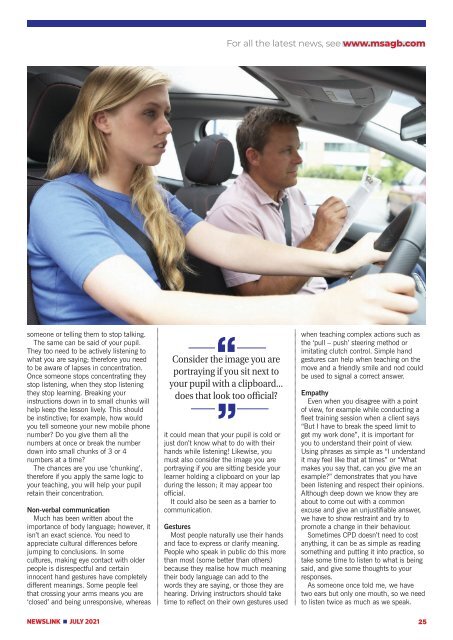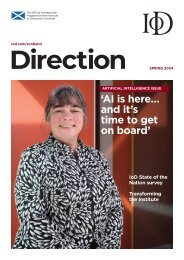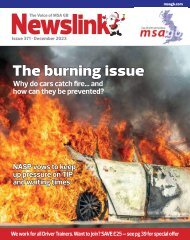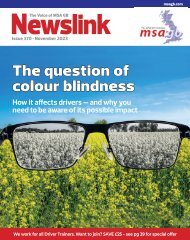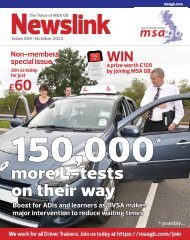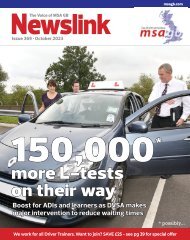MSA GB Newslink July
Motor Schools Association of Great Britain; Newslink; driving instructors, advice, training and road safety news
Motor Schools Association of Great Britain; Newslink; driving instructors, advice, training and road safety news
- No tags were found...
Create successful ePaper yourself
Turn your PDF publications into a flip-book with our unique Google optimized e-Paper software.
For all the latest news, see www.msagb.com<br />
someone or telling them to stop talking.<br />
The same can be said of your pupil.<br />
They too need to be actively listening to<br />
what you are saying; therefore you need<br />
to be aware of lapses in concentration.<br />
Once someone stops concentrating they<br />
stop listening, when they stop listening<br />
they stop learning. Breaking your<br />
instructions down in to small chunks will<br />
help keep the lesson lively. This should<br />
be instinctive; for example, how would<br />
you tell someone your new mobile phone<br />
number? Do you give them all the<br />
numbers at once or break the number<br />
down into small chunks of 3 or 4<br />
numbers at a time?<br />
The chances are you use ‘chunking’,<br />
therefore if you apply the same logic to<br />
your teaching, you will help your pupil<br />
retain their concentration.<br />
Non-verbal communication<br />
Much has been written about the<br />
importance of body language; however, it<br />
isn’t an exact science. You need to<br />
appreciate cultural differences before<br />
jumping to conclusions. In some<br />
cultures, making eye contact with older<br />
people is disrespectful and certain<br />
innocent hand gestures have completely<br />
different meanings. Some people feel<br />
that crossing your arms means you are<br />
‘closed’ and being unresponsive, whereas<br />
Consider the image you are<br />
portraying if you sit next to<br />
your pupil with a clipboard...<br />
does that look too official?<br />
‘‘‘‘<br />
it could mean that your pupil is cold or<br />
just don’t know what to do with their<br />
hands while listening! Likewise, you<br />
must also consider the image you are<br />
portraying if you are sitting beside your<br />
learner holding a clipboard on your lap<br />
during the lesson; it may appear too<br />
official.<br />
It could also be seen as a barrier to<br />
communication.<br />
Gestures<br />
Most people naturally use their hands<br />
and face to express or clarify meaning.<br />
People who speak in public do this more<br />
than most (some better than others)<br />
because they realise how much meaning<br />
their body language can add to the<br />
words they are saying, or those they are<br />
hearing. Driving instructors should take<br />
time to reflect on their own gestures used<br />
when teaching complex actions such as<br />
the ‘pull – push’ steering method or<br />
imitating clutch control. Simple hand<br />
gestures can help when teaching on the<br />
move and a friendly smile and nod could<br />
be used to signal a correct answer.<br />
Empathy<br />
Even when you disagree with a point<br />
of view, for example while conducting a<br />
fleet training session when a client says<br />
“But I have to break the speed limit to<br />
get my work done”, it is important for<br />
you to understand their point of view.<br />
Using phrases as simple as “I understand<br />
it may feel like that at times” or “What<br />
makes you say that, can you give me an<br />
example?” demonstrates that you have<br />
been listening and respect their opinions.<br />
Although deep down we know they are<br />
about to come out with a common<br />
excuse and give an unjustifiable answer,<br />
we have to show restraint and try to<br />
promote a change in their behaviour.<br />
Sometimes CPD doesn’t need to cost<br />
anything, it can be as simple as reading<br />
something and putting it into practice, so<br />
take some time to listen to what is being<br />
said, and give some thoughts to your<br />
responses.<br />
As someone once told me, we have<br />
two ears but only one mouth, so we need<br />
to listen twice as much as we speak.<br />
NEWSLINK n JULY 2021<br />
25


